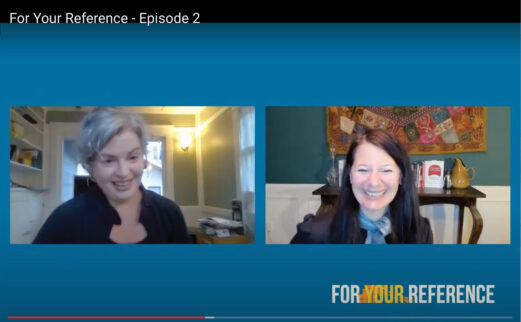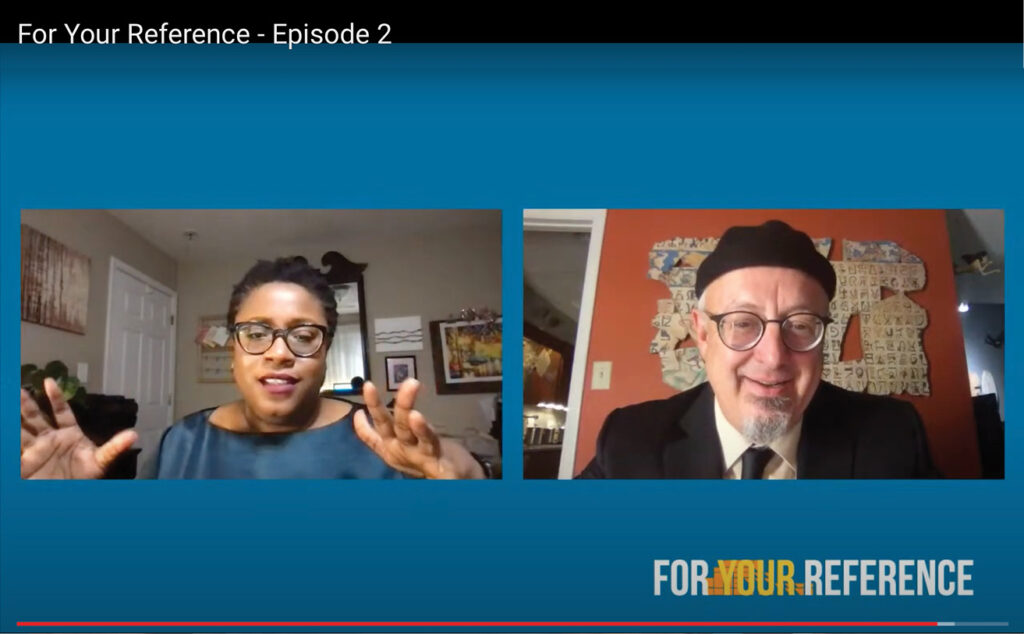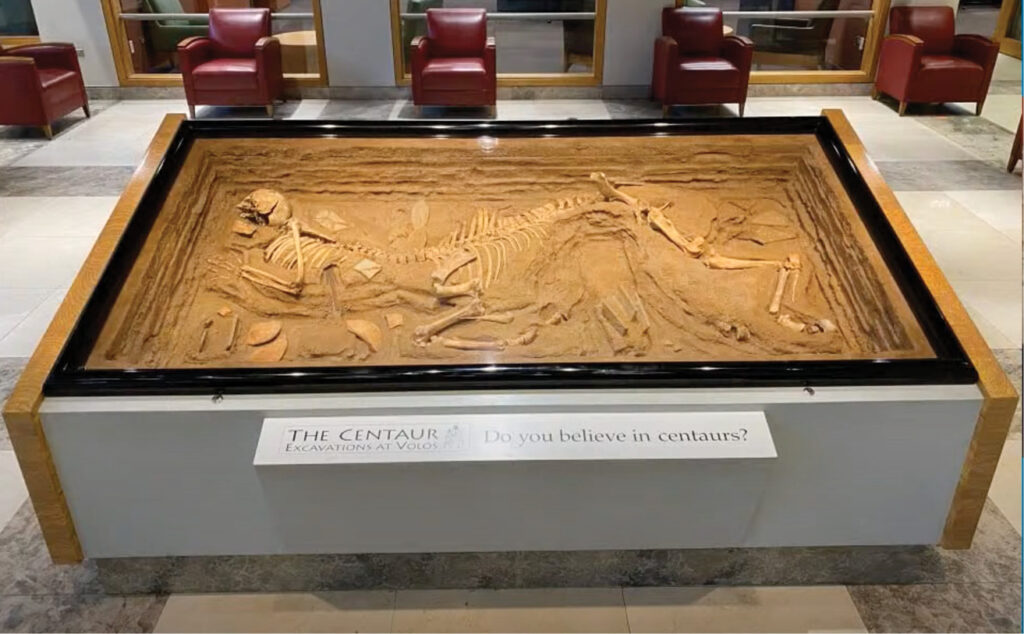
How can faculty scholars more effectively engage the public? That was the question posed to guest scholars January 14 on episode 2 of UT Libraries’ livestreamed show, For Your Reference.
Amy Young, professor of communication at Pacific Lutheran University, and Jennifer Mercieca, professor of rhetoric and public affairs at Texas A&M University, discussed how university faculty can help bridge the gap between academia and the public.
“We don’t engage with the public, and then the public doesn’t think that what we do has any value. And then — even worse than that — they are suspicious of us and our motives,” Young said. “I worry that all of academic disciplines have lost that ability to communicate, that we’re not public enough with what we know, and we don’t try to communicate in a way that encourages the public to value what we do and to trust us,” Mercieca continued.
Part of the problem is that university scholarship, by and large, is not accessible to the public. Most faculty scholarship is published in peer-reviewed academic journals that are hidden behind a paywall. And too many of those scholarly articles are written for a target audience of faculty peers and contain arcane terminology that is unfamiliar to the general public.
Yet university faculty study and write about issues of vital importance to society. And their insights should be part of the public discourse on current events and policies.
Young and Mercieca suggest that, in addition to publishing in academic journals, faculty scholars should present their research in public spaces such as social media, podcasts, and interviews with the popular press. Yet, many universities do not value their faculty’s public scholarship. On the contrary, incentive structures at most universities prioritize precisely those publishing venues that are least accessible to the public. A faculty member’s record of publication in academic journals carries enormous weight in tenure and promotion deliberations.
“We’re evaluated, at my university anyway, primarily on our research productivity. So that is limited to the articles that we place in scholarly journals and other kinds of publications that are peer reviewed by other scholars,” Young said. “There’s no room in those evaluation criteria for doing things for the public.”
Academia has devised metrics such as “h-index” to assess the stature of a faculty member’s research and “impact factor” to rank the prestige of journals within a discipline. “They’re used as ways to evaluate the weight of the work that you do and the venue that is publishing that work,” Young explained. “And that is probably, in this era, a kind of lousy way to count impact, right? I mean, in my mind, if you have something that has been circulated thousands of times by interested people in spaces where it’s going to create conversation and lead people to ask questions or think about something differently, that has an enormous amount of impact.”
Even land-grant universities attach little importance to public scholarship. “That’s supposed to be the mission of the university, right?” Young said. “You’re supposed to be contributing back to that broader community.”
In a forthcoming article in the journal Rhetoric and Public Affairs, Young and Mercieca argue that, in order to reach non-expert audiences, faculty scholars could adopt different stylistic conventions in their writing, and peer-reviewed academic journals could invite and publish other kinds of writing. Academic journals could increase both their readership and the impact of their publications by making at least one article in each issue “open access.”
Libraries, too, can play a role in making faculty scholarship more widely available. Many university libraries host institutional repositories – such as TRACE at the University of Tennessee — that make faculty scholarship freely available.
Our moderator Robin Bedenbaugh explained that “what libraries want to do is make sure that your work is available.” She invites university faculty to “look on your library’s website and see if you have someone who is referred to as your scholarly communication librarian.” That librarian can “work with you on the agreement that you sign with your publisher so that you retain some measure of your copyright … so that at least maybe you can put your author’s final draft up” on your institutional repository’s website. “Anybody who wants to interact with those ideas can do so through your repository.”
In the “Check This Out” segment of episode 2, moderator Casey Fox interviewed librarian Grace Therrell about how the UT Libraries makes scholarship available to the public.
Their conversation began with a discussion of “information privilege.” “What information privilege means, in a nutshell, is pretty much who has access to information and why they have that access,” Therrell said. As members of the UT community, faculty and students have free access to a vast selection of scholarship. This is not true for members of the general public who are not affiliated with a university or other research institution. “I’m sure people in the audience have had this happen … You’re just looking up a topic on Google … you see that an article exists … and then you click on it, and Google says, Hey, great, give us fifty dollars and we’ll give you this information.” It is part of Therrell’s job as an online learning librarian to help library users, including members of the community who are not affiliated with our university, to find and evaluate information sources.
Research assistance is available to the broader community in person at one of our libraries or through the “chat” service on our website (lib.utk.edu). “You can always ask a librarian,” Therrell said. “That service is not just for students or faculty or members of the UT community. That’s for everyone … And we can connect you to information that is not behind the paywall.” In addition, librarians have created teaching tools that are freely available on the UT Libraries’ website. “We have things like research guides and different tutorials that can help you work through the research process, that can help connect you to information in a specific discipline, a specific subject, specific topic.”

The concluding conversation of each For Your Reference is a segment we call “Stories From the Stacks.” For episode 2, moderator Ingrid Ruffin interviewed Beauvais Lyons, a Chancellor’s Professor and member of UT’s School of Art. Ruffin introduced her guest as “the self-appointed director of the Hokes Archives.” That’s “Hokes” as in “hoax.” Lyons specializes in academic parody and is known for his work in mock archaeology.
Lyons recounted the (apocryphal) history of “The Centaur Excavation at Volos,” an archeological installation at UT’s John C. Hodges Library. “The centaur we have in the library is one of three centaur burials discovered in 1980 by the Archaeological Society of Argos Orestiko, 8 kilometers northeast of Volos, Greece. And our centaur is the largest adult male centaur in a university library in North America,” Lyons told our audience. In truth, the “centaur” was fabricated by a biology professor using a retired human study skeleton and the skeleton of a Shetland pony.

The centaur that now resides in Hodges Library has been written about in a number of publications, such as Adrienne Mayor’s The First Fossil Hunters. “She argues that in the ancient world, when ancient peoples encountered fossils, that these were the source for their imagination,” Lyons said. “So, a mastodon with a large nasal cavity was a cyclops skeleton. The griffin resembles dinosaurs and so forth. So, it’s a wonderful example of a kind of fertilization of art and science, of history, truth, imagination. And that’s what the library is for. It’s a place for discovery. It’s a place to ask yourself questions.”
The centaur is also an object lesson in approaching all information sources with a degree of skepticism — even evidence seen with your own eyes.
Lyons had the final word of the evening: “So, Ingrid, do you believe in centaurs?”